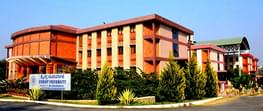Dr. S. Rajkumar is an accomplished professional with a diverse and extensive academic background, currently serving as the Dean of Management Studies (UG & PG) at Mount Carmel College, Autonomous in Bengaluru. He holds multiple degrees, including an MBA from Bharathidasan University and an MHRM from Christ College. He has pursued further academic achievements, obtaining an M. Phil from Periyar University and a Ph.D. from Bangalore University. Additionally, he has completed a PG program in Management from IIM Kashipur, showcasing his commitment to continuous learning and professional development. Dr. Rajkumar is actively engaged in the academic community, serving as a Board of Studies (BOS) Member for institutions such as Bengaluru City University, St Joseph’s University, National College, and Jain University. With an impressive 25 years in the academic field, he brings a wealth of knowledge and experience to his role. His research contributions are notable, with 20 years of research experience, 4 authored books, and around 20 research papers published in both national and international journals. Dr. Rajkumar's work has received recognition, evidenced by the award of 4 patents (1 Australian and 3 Indian) and a UGC Minor Research Project with a grant. As an internal member for the NAAC Accreditation Process across all four cycles, Dr. Rajkumar plays a crucial role in ensuring and maintaining the quality of education. Additionally, he serves as the Nodal Officer for AISHE-MHRD (All India Survey on Higher Education) and NIRF (National Institutional Ranking Framework), further emphasizing his commitment to institutional excellence and transparency.

What is the vision and mission of your college in terms of providing education and preparing students for the future?
The school of Management aspires to provide comprehensive management education and facilitate essential skills for their seamless integration into society and act as change agents to assume influential, responsible positions within the industry. My mission is to nurture and cultivate student’s expertise and contextual understanding in line with the Industry requirements, familiarize the students to both micro and macro business environments that impact business, and to provide students with entrepreneurial acumen and profound appreciation for the significance of resource management in the context of business operations.
In your opinion, what is the most significant challenge that educators face today, and how do you think they can overcome it?
One of the most significant challenges that educators face today is adapting to the rapidly evolving landscape of technology and its integration into education. The pervasive use of digital tools, online learning platforms, and the increasing importance of technology skills pose a considerable hurdle for many educators. To overcome this challenge, educators need to embrace ongoing professional development opportunities that focus on technological literacy and innovative teaching methodologies. Collaborative efforts within educational institutions to share best practices and resources can also enhance educators' ability to integrate technology effectively into their teaching. Additionally, fostering a mind-set of adaptability and a willingness to experiment with new pedagogical approaches can empower educators to navigate the digital transformation of education successfully.
How does your institution ensure that teachers stay up-to-date with new technologies and teaching methods to enhance the quality of education?
MCC employs a multifaceted approach to ensure that teachers remain current with evolving technologies and effective teaching methods. Some common strategies include: Professional Development Programs, Technology integration Training, Peer Collaboration, Access to E-Resources, Innovation Grants/ Research/ Patents, Partnership with e-tech companies, Regular Assessments and Feedback, and Institutional Culture of Innovation.
Check Mount Carmel College Scholarship
What are your thoughts on the National Education Policy (NEP) in India, and what steps are being taken by your institution to implement its objectives in the curriculum?
The key thoughts of the NEP include promoting flexibility in the choice of subjects, introducing a multi-disciplinary approach, integrating technology, and fostering critical thinking and creativity. MCC took part in the initiative to implement its objectives in the curriculum. Curriculum Reforms: Reviewing and revising existing curricula to align with the multi-disciplinary and flexible approach advocated by the NEP. Skill Development: Emphasizing skill development by incorporating practical, hands-on learning experiences into the curriculum. Technology Integration: Embracing technology in teaching and learning processes. Assessment Reforms: Moving towards a more holistic and continuous assessment system, reducing the emphasis on high-stakes exams. Research and Innovation: Encouraging Faculty members and Students to be actively involved in research and innovation.
What initiatives or strategies has your college adopted to provide students with a competitive edge in the job market and help them with placements?
MCC adopt to give students a competitive edge in the job market and support them in placements: Industry-Relevant Curriculum: MCC, Design the curriculum that aligns with industry needs and includes practical skills, hands-on experience, and the latest developments in the field. Skill Development Programs: On a regular basis, MCC offers skill development programs, workshops, and training sessions to enhance students' employability skills, including communication, teamwork, problem-solving, and critical thinking. Internship Opportunities: Facilitating internships and industry placements to provide students with real-world experience and exposure to the professional work environment. Industry Partnerships: SoM in collaboration with industry partners for guest lectures, seminars, and workshops, allowing students to interact with professionals and gain insights into industry expectations. Placement Cell: MCC has a dedicated and dynamic placement cell that actively engages with companies, organizes recruitment drives, and facilitates on-campus and off-campus placements for students. Resume Building Workshops: SoM Conducts regular workshops on resume writing, cover letter preparation, and job interview techniques to help students present themselves effectively to potential employers. Industry Certifications: we encourage industry-recognized certifications into the curriculum to enhance students' credibility and competitiveness in the job market; eg- Microsoft certifications.







.png?h=132&w=263&mode=stretch)
































.png?h=72&w=72&mode=stretch)

.png?h=72&w=72&mode=stretch)



















Comments